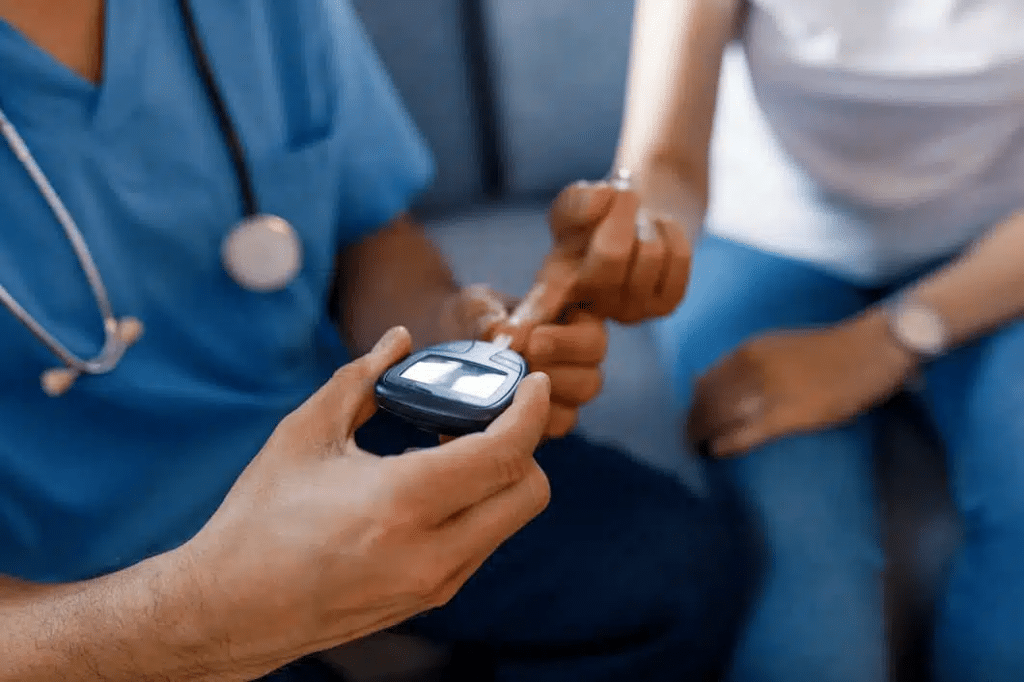Diabetes management in East Texas
At UT Health East Texas, we are dedicated to providing exceptional diabetes management services tailored to the unique needs of each patient. Our team of diabetes specialists is committed to delivering comprehensive diabetic treatments and diabetes self-care education to ensure you are cared for and supported every step of the way. We understand the challenges faced by those living with diabetes, and our diabetes care team is here to offer compassionate care you can depend on.

Type 1 diabetes
Type 1 diabetes is a chronic autoimmune disease where the pancreas produces little or no insulin, a hormone essential for converting carbohydrates into energy. In this condition, the immune system mistakenly attacks and destroys the insulin-producing beta cells in the pancreas, leading to high levels of glucose in the bloodstream.
Research indicates that type 1 diabetes results from a combination of genetic, environmental, and immune system factors. According to the American Diabetes Association, individuals inherit a susceptibility to the disease, which is then activated by environmental triggers. However, not everyone at risk develops diabetes.
Though it most commonly appears in children and young adults, type 1 diabetes can develop at any age. With proper management, including recognizing symptoms early, people with type 1 diabetes can lead healthy lives. Early detection and treatment are crucial to reduce the risk of serious complications.
Common symptoms of type 1 diabetes include:
- Blurred vision
- Cuts/bruises that are slow to heal
- Extreme fatigue
- Feeling hungry, even while you’re eating
- Feeling very thirsty
- Frequent urination
- Sudden weight loss
Type 1 diabetes symptoms often appear suddenly and can rapidly become severe. These symptoms occur because the body’s immune system mistakenly attacks and destroys insulin-producing cells in the pancreas, leading to elevated blood glucose levels. Recognizing these symptoms early is crucial for timely diagnosis and management of the condition.
Insulin therapy is essential for managing Type 1 diabetes. This treatment involves administering insulin through injections or a pump with the goal of controlling your blood glucose levels. The type of insulin and dosage are tailored to your individual blood sugar patterns, lifestyle, and insulin sensitivity.
Type 2 diabetes
Type 2 diabetes is the most common form of diabetes. It occurs when your body does not use the insulin it produces properly. While medication or insulin may be used to manage type 2 diabetes, a healthy diet and regular exercise are key components of treating Type 2 diabetes. Type 2 diabetes can be delayed or even prevented, so i’s important to know if you’re at risk.
Risk factors for type 2 diabetes and prediabetes include:
- Age, if over 45
- Diabetes during pregnancy
- Family history of type 2 diabetes
- High blood pressure
- Lack of regular physical activity
- Low HDL cholesterol levels
- Overweight/obesity
Type 2 diabetes symptoms develop gradually, often over several years, and are frequently so subtle they may go unnoticed. Many individuals with type 2 diabetes experience no symptoms at all, and some only discover they have the condition when they encounter complications like blurred vision or heart issues.
Our Tyler and North Campus Tyler facilities offer diabetes education programs to help you learn how to manage your diabetes. Take the Type 2 diabetes risk test to see if you could be at risk for diabetes. This screening tool can help assess your personal risk for diabetes.
Diabetes and heart health
Having type 2 diabetes makes you two to four times more likely to develop heart disease and stroke. In the United States, an adult with diabetes is hospitalized for heart disease every 80 seconds. For adults over 60, type 2 diabetes combined with cardiovascular disease can shorten life expectancy by an average of 12 years.
By managing your diabetes and risk factors, heart disease can be delayed or in some cases, prevented entirely. Talk to your healthcare provider to help monitor your risk factors, such as blood sugar levels, weight, cholesterol levels and blood pressure.
UT Health East Texas offers cardiac care at our facilities across East Texas. UT Health Tyler is an accredited Chest Pain Center, providing expertise and a commitment to treating patients with heart attack symptoms.
Diabetes and weight loss management
diabetes. Excess weight not only increases your likelihood of developing diabetes but also elevates your risk for other health issues such as heart disease, stroke, and high cholesterol. While losing weight can be challenging and requires time, shedding even just 10-15 pounds can greatly improve your overall health.
At UT Health East Texas, we want to help. Dr. Ryan Menard, a board-certified family medicine and obesity medicine physician, offers comprehensive weight loss treatments at our weight-management clinic. During your visit, Dr. Menard will cover many aspects related to weight, including a dietary and activity assessment, cardiovascular and metabolic risk assessment, as well as medication assistance to help lose weight and improve health and more.
We also have a bariatric surgery clinic, UT Health Tyler Bariatric Center, with two bariatric surgeons, Dr. Hugh Babineau and Dr. Charles Keith. Both are board-certified in general surgery and specialize in bariatric surgery. In addition to providing significant weight loss, bariatric surgery can help improve diabetes and decrease your risk of heart attack and stroke.
To learn more about our weight loss services at the UT Health Bariatric Center, please call 903-593-0230.
Diabetic wound treatment
Foot and wound care are very important for people with diabetes. Diabetic patients often have peripheral arterial disease (PAD), which reduces blood flow to the feet and makes it easier to get ulcers and infections. Depending on the severity of the infection, diabetic foot wounds may only be treatable with amputation. Fortunately, most diabetic amputations are preventable with proper care and footwear.
Our wound healing clinics can help. The Wound Healing Center in Tyler is an accredited clinical hyperbaric medicine facility, one of only 203 in the nation. Our providers will design a specific treatment plan to meet your needs, ensuring you receive exceptional diabetic wound care.
Diabetes and vision loss
Did you know that diabetes can affect your vision, even to the point of blindness? The blood vessels in the back of your eyes can become damaged, resulting in bleeding, which causes fluid to leak into the retina. This condition is called diabetic retinopathy (DR) and it can affect anyone with diabetes, no matter if it’s type 1, type 2 or gestational. The longer you have diabetes, the more likely this condition is to occur. However, the better you control your blood glucose levels, the less risk you have of developing DR. Patients with diabetes should receive annual eye exams to ensure they stay ahead of their vision health.
Our clinics at Cedar Creek Lake in Gun Barrel City and 5th St. in Tyler can help by offering all patients with diabetes an IRIS exam. This is a simple and easy eye exam for early detection of DR to help prevent blindness in patients with diabetes. During the exam, the patient is placed in a dark room to allow the eyes to dilate. The technician will take several photos inside the eye. Nothing will actually touch the eye, only bright light flashes from the camera. The tech will send the photos to IRIS for processing and your provider will receive the results.
Since October 2018, our clinics have captured more than 750 exams using this IRIS platform and almost 50% of cases identified DR or signs of DR. Many patients don’t know they have this condition until it affects their vision, so early detection is key. Early detection and treatment can reduce your risk of blindness by 95%.
Helpful links
We’ve compiled the following links to help you learn more about diabetes. Click any link below to read more:
Schedule an Appointment
UT Health North Campus Tyler
Group Education
UT Health Diabetes University in Tyler
One-On-One Education
Learn More About Diabetes at These UT Health Hospitals

UT Health Tyler
Learn More
UT Health North Campus Tyler
Learn More